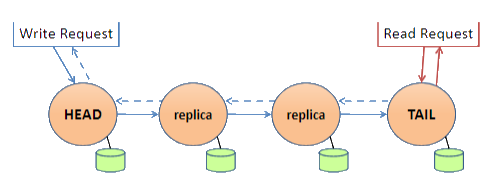CRAQ (Chain Replication with Apportioned Queries) builds upon traditional chain replication techniques to enhance read throughput while maintaining strong consistency as a solution for read-mostly workloads. The innovations brought forth by CRAQ represent a substantial advancement in the field of distributed object storage. By balancing the need for strong consistency with the demand for high throughput, CRAQ not only enhances the capabilities of traditional chain replication but also addresses the varied requirements of modern applications.
The Challenges of Object Storage
Modern storage systems are designed to handle massive amounts of data across potentially faulty components. They often replicate and partition data to ensure reliability and scalability. However, many existing systems sacrifice strong consistency for improved availability and performance.
Traditional chain replication offers a solution by organizing nodes in a chain where all write operations are handled by the head node and read operations by the tail node. While this approach guarantees strong consistency, it limits read throughput to that of a single node, creating potential bottlenecks, especially in read-heavy environments.
CRAQ: Addressing the Bottleneck
CRAQ addresses these limitations by allowing any node within the chain to handle read operations. This method distributes the read load across all nodes, significantly improving throughput while preserving strong consistency. By enabling apportioned queries, CRAQ ensures that read operations can be executed in parallel, thus scaling linearly with the number of nodes in a chain.
-
Strong Consistency with Enhanced Throughput: CRAQ maintains the strong consistency guarantees of traditional chain replication, ensuring that all read and write operations are executed in a sequential order. This is achieved by allowing nodes to store multiple versions of an object, with clean and dirty states to manage the consistency of read operations.
-
Eventual Consistency Support: Beyond strong consistency, CRAQ can also support eventual consistency, allowing for lower-latency reads during periods of write contention. Applications can specify acceptable staleness for read operations, providing flexibility based on the application requirements.
-
Wide-area Optimization: For geo-replicated environments, CRAQ is designed to minimize latency by optimizing the selection of chain nodes across datacenters. The system can efficiently handle read requests locally, thus reducing the number of wide-area requests.
Multi-object Atomic Updates and Multicast Enhancements
CRAQ also explores advanced features like multi-object atomic updates and multicast optimizations for large object writes. The integration of mini-transactions allows applications to perform operations on multiple objects with transactional guarantees, enhancing the functionality beyond simple key-value storage.
In scenarios involving large updates, CRAQ can utilize multicast protocols to propagate writes efficiently, significantly reducing the time taken for updates to be reflected across the chain.
Performance Evaluation
Initial performance evaluations of CRAQ demonstrate significant improvements over traditional chain replication. In read-mostly workloads, CRAQ's throughput can be up to 600% higher with larger chain sizes. Even under write contention, CRAQ outperforms traditional methods by efficiently managing read requests through version queries.
Key Concepts
- Prepend/Append: This operation involves adding data to the beginning or the end of an object's current value.
- Increment/Decrement: These operations add to or subtract from a key's object, which is interpreted as an integer value.
- Test-and-Set: This operation updates a key's object only if its current version number matches the version number specified in the operation. For the Test-and-Set operation, the head checks the latest committed version number and manages any outstanding writes accordingly
- Dirty Version: Refers to the latest version of an object that has not yet been committed, meaning it may contain uncommitted changes.
- Batch Updates: A process where multiple updates are collected and executed together, enhancing efficiency, especially for frequent operations.
- Two-Phase-Commit Protocol: A traditional database protocol used to ensure that all parts of a transaction are completed successfully before finalizing any changes.
- Locking: A method to prevent concurrent writes to an object by disallowing any writes until the object is in a clean state, ensuring data integrity.
@inproceedings{terrace2009object,
title={Object storage on CRAQ: High-throughput chain replication for read-mostly workloads},
author={Terrace, Jeff and Freedman, Michael J},
booktitle={USENIX Annual Technical Conference},
year={2009}
}
